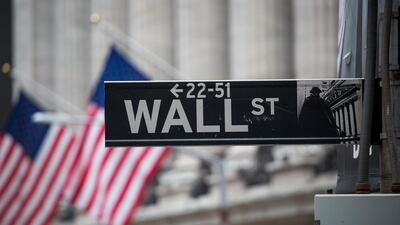While most money managers hunt for bargains in the market upheaval, Jonas Kron is searching for good guys.
“We’ve sought to find companies that invest in their employees rather than treat them as disposable,” said Mr Kron, who helps oversee $3 billion (Dh11bn) as director of shareholder advocacy at Boston-based Trillium Asset Management.
The drive toward sustainable investing has shifted in response to the coronavirus, which has spread to 170 countries. ESG investors such as Mr Kron haven’t quit caring about limiting fossil fuels, cultivating diverse workforces and reducing the use of plastics, and they’ve always taken an interest in worker welfare.
But they’re focusing more now on how companies treat employees during the pandemic. While the Federal Reserve commits trillions to rescue financial firms and the US Congress readies checks for a couple thousand each to working Americans, Mr Kron is one of a group from Wall Street’s buy-side that sees it as part of the job to look out for them.
“The American worker, who’s the backbone of the economy, has been in a tenuous position,” Mr Kron said. “The coronavirus is making apparent to a lot of people the consequences of not having a significant social net.” Companies’ interactions with employees during the health crisis also preoccupies John Streur, chief executive of Eaton Vance’s responsible-investment unit, Calvert Research and Management. Among the issues are how employers deal with contract workers, whether they cut loose employees or keep paying them during the pandemic, whether they provide adequate medical insurance and if they allow working from home.
“People will remember how companies treated their workers and how they behaved within the community,” Mr Streur said.
At the same time, Benjamin Allen of Parnassus Investments is keeping an eye on the communities most affected by the historic fall in oil prices.
“Just think about the mom-and-pop stores, the restaurants in West Texas and other communities that were booming just a year ago,” Mr Allen said on a conference call with investors last week.
The funds the three represent have mostly beat the S&P 500’s 23.9 per cent drop this year through Tuesday. The Calvert Equity Fund is down 17.8 per cent. Parnassus’s Core Equity Fund has tumbled 20.6 per cent, while Trillium’s ESG Global Fund has lost 23 per cent.
The landscape for American workers looks grim. Airlines, manufacturers and local businesses are among the businesses that have cut back operations or shuttered them entirely to stem the spread of Covid-19. The national jobless rate could surge above 8 per cent in the next three months, according to Bloomberg News calculations. Other estimates look worse. James Bullard, president of the Federal Reserve Bank of St. Louis, said unemployment could hit 30 per cent in the second quarter.
Among the 100 largest US employers, 36 per cent have adopted some form of paid sick leave and 28 per cent continue to pay hourly employees affected by changes in operational hours and closures, according to an analysis by JUST Capital, an ESG research group that’s tracking how US workers are faring during the pandemic.
“A number of companies have updated their policies as many as four times since the virus outbreak,” said Alison Omens, the nonprofit group’s chief strategy officer.
The three leaders in ESG investing said they keep tabs on companies they believe are doing the right things.
Mr Kron said he likes Microsoft’s requirement that contract companies provide paid leave to their workers.
Mr Streur cited financial-software maker Workday and Shopify, an online showcase for merchants, as helping to blunt the economic effect of coronavirus.
Workday, with 12,200 employees, announced a one-time cash bonus equivalent to two weeks pay for each active worker. The company said it’s also creating a relief fund, expanding benefits like paid sick leave and childcare and giving employees access to a meditation app.“That’s an example of a company taking an initial step that’s more comprehensive than those who are giving employees $1,000 to ensure they have the right office supplies,” Mr Streur said.
Mr Allen lauded Waste Management and Starbucks for safeguarding employees and customers. Waste Management said it would guarantee as many as 40 hours of pay a week for employees during the pandemic. Starbucks said it will expand emergency pay for US staff. The coffee chain said it will also offer “additional pay replacement” for as many as 26 weeks to employees unable to return to work.
One thing the three investors have in common: a distaste for stock buybacks, which they said put executive bonuses ahead of investment in workers.
“We need to tell companies they need to use their cash to take care of employees,” Mr Streuer said. “In the long term, that will have a positive impact on the stock.”

